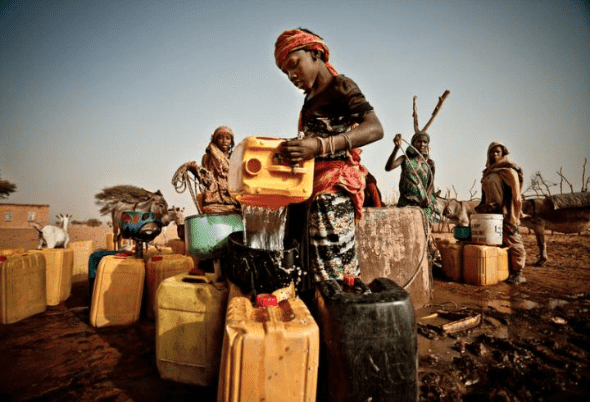Climate change, global warming to significantly increase the risk of violent armed conflicts: Study

Escalating climate change and the rise in global temperatures will substantially increase future risks of violent armed conflicts within countries, reveals a study led by Stanford University.
The findings, published in the journal Nature, said that in a scenario with 4 degrees Celsius of warming - which is where countries are headed if they do not reduce emissions considerably, according to the researchers - the influence of climate on conflicts would go up by over five times, leaping to a 26% chance of an increase in conflict risk.
The report further said that even in a scenario of 2 degrees Celsius of warming – which is the stated goal of the Paris Climate Agreement – the influence of climate on conflicts would more than double, rising to a 13% chance.
Since studies on the relationship between climate and conflict are diverse and contested, the researchers evaluated the current understanding of this relationship with the help of an expert group.
“Climate variability and change are estimated to have substantially increased risk across 5% (mean estimate across experts) of conflicts to date. By contrast, an approximately 2°C increase in the global mean temperature above pre-industrial levels is estimated to substantially increase conflict risk with 13% probability, rising to 26% probability under an approximately 4°C warming scenario.
A ‘substantial’ increase in conflict risk was defined as involving severe and widespread effects, based on criteria for key risks that have been developed and applied in assessments by the Intergovernmental Panel on Climate Change (IPCC),” said the paper.
The expert team - led by Katharine Mach, Director of Stanford Environment Assessment Facility - comprised three assessment facilitators and a group of 11 climate and conflict experts from diverse fields.
“We used novel methods of expert assessment, combining three distinct approaches that have been applied previously. First, we conducted 6-8 hours of expert elicitation interviews with leading scholars in political science, economics, and environmental science. Second, we brought them together for deliberation and debate on the most compelling and challenging open questions about current knowledge. Third, we distilled 950 pages from the elicitation interviews and group deliberation into a draft paper. The full expert group worked together to develop and refine it,” Mach told MEA WorldWide (MEAWW).
Synthesizing views across experts, the study estimated that climate has influenced between 3% and 20% of armed conflict risks over the last century and that the influence will likely increase dramatically.
Mach told MEAWW that there was a strong agreement that climate has affected the risk of organized armed conflict within countries to date, although other drivers, such as low socio-economic development and low capabilities of the state, are critical. She added that in the future, intensifying climate change would increase risks of conflict, going beyond current experiences.
"While climate change can contribute to increasing armed conflict by affecting known drivers of conflict, such as socio-economic development or inequalities among groups, it can go beyond existing experiences. For example, future climate change impacts affecting the risk of conflict could include substantial economic impacts, climate-related disasters, impacts on agricultural production, or impacts exceeding existing institutions, for instance, related to migration,” Mach said.
The paper said that climate-related hazards, variability, and change could cause economic shocks through effects on agricultural productivity or food prices, or through the direct and indirect consequences of disasters such as floods, droughts, heat waves or cyclones. Such shocks, said the findings, could heighten conflict risks.
“Climate change-driven extreme weather and related disasters can damage economies, lower farming, and livestock production and intensify inequality among social groups. These factors, when combined with other drivers of conflict, may increase risks of violence," said researchers in a university release.

According to Mach, the study has two main implications. She said for those focused on climate, the research has characterized complex and consequential impacts of continuing emissions of heat-trapping gases.
“The social costs of climate change are substantial. Secondly, for those focused on conflict, our results identify entry points for managing the impacts of climate change for human security in a holistic way. They can help prioritize societal responses, which could include enhanced aid and cooperation,” Mach told MEAWW.
Reducing conflict risk and preparing for a changing climate can be a win-win approach, said the researchers. The study explains that adaptation strategies such as crop insurance, post-harvest storage, training services, and other measures, can increase food security and diversify economic opportunities, thereby reducing potential climate-conflict linkages.
“Peacekeeping, conflict mediation, and post-conflict aid operations could incorporate climate into their risk reduction strategies by looking at ways climatic hazards may exacerbate violent conflict in the future,” the release said.
However, the researchers noted that there is a need to increase understanding of these strategies’ effectiveness and potential for adverse side effects. For example, food export bans following crop failures can increase instability elsewhere, they said.
“This paper, in many ways, is a starting point for policy and practice, as well as future research. All of the co-authors continue to work on the topic,” said Mach.
Marshall Burke, assistant professor of Earth system science and a co-author on the study, said in the release that knowing whether environmental or climatic changes are important for explaining conflict “has implications for what we can do to reduce the likelihood of future conflict, as well as for how to make well-informed decisions about how aggressively we should mitigate future climate change.”










